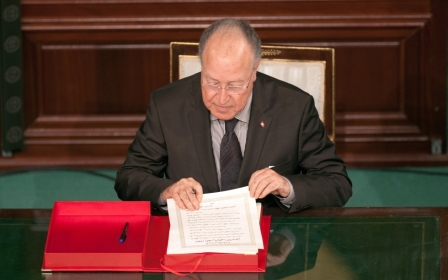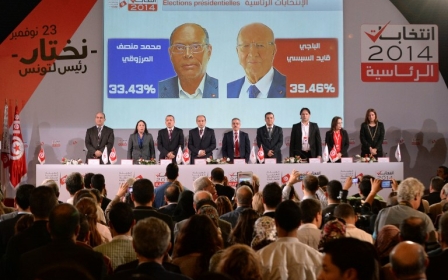Former Tunisian PM Hamad Jebali leaves Ennahda party

Former Tunisian Prime Minister, Hamadi Jebali on Thursday declared his resignation from the Ennahda party, only ten days before presidential elections are due to take place in the country.
Jebali, who had been secretary-general of Ennahda since 1981, announced his resignation on Twitter, saying he was leaving to dedicate himself to defending “the freedoms and the values that the revolution happened for.”
He originally became prime minister in December 2011, after the country's first democratic elections were won by Ennahda - he resigned in February 2013 during the crisis that followed the murder of prominent left-wing opposition leader, Chokri Belaid.
Seifeddine Ferjani, a researcher at the Round Table Studies who is also close to Ennahda , told Middle East Eye that the move had been a long time coming and was not “acrimonious.”
“Jebali for a long time now wanted to engage a lot more with all aspects of Tunisian society without recourse back to Ennahda,” he said. “He wanted to have that independence.”
“It’s a way of building trust with constituencies in Tunisia who still feel really suspicious of Ennahda and its project.”
In a message posted on Thursday on his Facebook, however, Jebali suggested splits had emerged.
"I chose to be among those activists eager to ensure the peaceful revolution triumphed,” he wrote.
“I have great difficulty in remaining faithful to this position given the state of Ennahda today. I find myself no longer agreeing with its choices," he said.
Some had observed divergences between Jebali and the rest of the party, particularly with regards to Ennahda’s decision on who to back in the upcoming Presidential elections run-off: Beji Caid Essebsi, a former minister in the government of Zine Abedine Ben Ali (who was overthrown in January 2011) or Moncef Marzouki, a former activist and incumbent president.
“Ennahda is under a lot of pressure to make up its mind,” said Radwan A. Masmoudi, president of the Centre of the Study of Islam & Democracy. “The majority of members are in favour of supporting Marzouki and probably the majority of the leadership is in favour of supporting Essebsi.”
He pointed out that Jebali had already “made his position known” with regards to the election, throwing his weight behind Marzouki.
Masmoudi told MEE that were Ennahda to support Marzouki, they would lose any opportunity to join a government with Essebsi’s Nidaa Tounes party, currently the largest party in the parliament.
Ferjani suggested that Jebali could also be looking towards the next presidential election and the possibility of throwing his hat into the ring.
“If Essebsi wins [the election], the man is 88 years old and it’s very difficult to see how he would be there for the full 5 years,” he said, pointing out that Jebali had missed out on an opportunity to run for the presidency after Ennahda decided not to put forward a candidate in 2014.
“There are people who will be disappointed,” Ferjani told MEE. “You could say he may have been a candidate to replace Sheikh Rashid [Ghannouchi, current leader] in some shape or form.”
In the first round of the presidential elections, Essebsi led with 39.46 percent of votes, six percent ahead of incumbent Marzouki.
Marzouki secured 33.43 percent of votes cast while left-wing figurehead, Hamma Hammami came in third with 7.82 percent, followed by London-based entrepreneur, Hechmi Hamdi with 5.75 percent, and wealthy businessman and football club president, Slim Riahi, with 5.55 percent.
The election was the first time Tunisians had voted freely for their head of state since independence from France in 1956.
Stay informed with MEE's newsletters
Sign up to get the latest alerts, insights and analysis, starting with Turkey Unpacked
Middle East Eye delivers independent and unrivalled coverage and analysis of the Middle East, North Africa and beyond. To learn more about republishing this content and the associated fees, please fill out this form. More about MEE can be found here.




